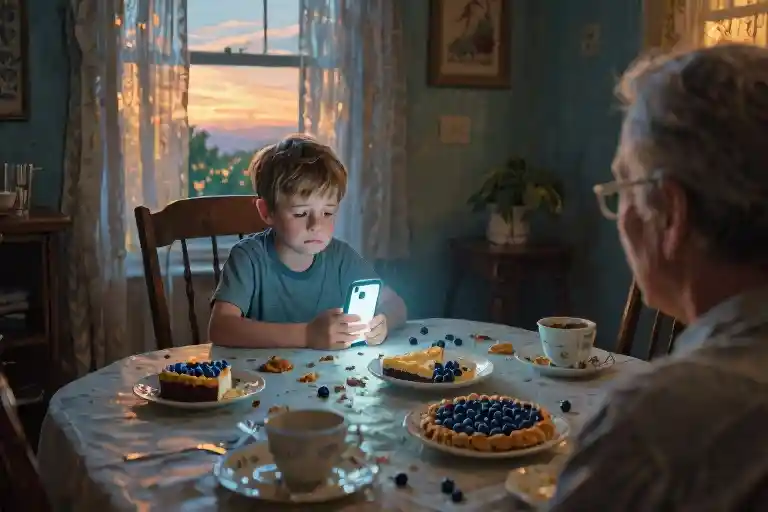The moment I found myself arguing with a nine-year-old about Fortnite prize money, I knew my visit to Maine had reached its expiration date. There’s a particular kind of weariness that sets in when you’re debating video game statistics with someone whose bedtime you used to enforce, and it usually signals it’s time to retrieve your suitcase from the guest room closet.
My nephew had cornered me near the snack table, his fingers still sticky from blueberry pie, eyes wide with the conviction of youth. “Bugha won thirty million dollars at one competition,” he declared, pronouncing the professional gamer’s nickname with the reverence most kids reserve for superheroes. The number hung in the air between us, inflated with childhood exaggeration and the peculiar economics of esports fame.
I felt my phone grow heavy in my pocket – that modern arbiter of truth that’s reshaped so many family disagreements. The appropriate adult response would have been a noncommittal “Wow” followed by a subject change, preserving both the child’s enthusiasm and the peaceful atmosphere of a summer visit. But something about the roundness of that thirty million figure made my fingers twitch toward my device. Maybe it was the journalist in me, maybe just middle-aged pedantry, but I watched my thumb unlock the screen with the grim determination of a sheriff drawing his pistol.
The search results loaded with brutal efficiency. “Actually,” I heard myself say, immediately regretting the word as my nephew’s smile faltered. “That tournament prize was three million.” I turned the screen toward him like presenting evidence in court, watching his face cycle through disbelief, betrayal, and finally tactical retreat.
“I meant all his competitions together,” he amended, chin jutting forward in that universal childhood gesture of revised facts. The goalposts moved with the fluid logic of someone whose age still required counting on fingers. This time when my phone and I exchanged glances – that silent communication perfected through years of settling bar bets and dinner table disputes – we both knew we were dealing with a different species of truth altogether.
The Outbreak of Data Warfare
The moment my nephew declared with absolute certainty that Fortnite pro Bugha had won $30 million at a single tournament, I felt that peculiar adult itch – the compulsive need to correct. It started innocently enough, just a casual conversation during family time in Maine. But when those inflated numbers hit my ears, my fingers twitched toward my phone before I could stop them.
“Actually,” I began – already a tactical error – “that tournament was $3 million.” The words tasted like cheap victory even as I spoke them. My nephew’s face did that remarkable child-thing where indignation and recalculations flicker across their features in real time.
His recovery strategy was textbook Gen Z: “I meant thirty million total. From all his competitions.” The decimal point had simply relocated itself, as children’s numbers often do when challenged. My phone and I shared what I can only describe as a technological grimace – that silent acknowledgment between device and user when you’re both being gaslit by a nine-year-old.
What followed was the digital age’s version of a Wild West showdown. Thumbs flying across glass, we descended into the rabbit hole of esports earnings statistics. The glow of the screen illuminated our faces as we scrolled through tournament records, each refresh bringing us closer to that modern holy grail: definitive proof.
This wasn’t just about Fortnite prize money anymore. Somewhere between the initial claim and my obsessive fact-checking, we’d crossed into uncharted parenting territory. The smartphone in my hand had become both weapon and witness in this intergenerational conflict, its algorithms quietly dismantling whatever residual authority my “because I said so” might have once held.
When the final number appeared – $3,777,425 in career earnings, to be exact – the satisfaction lasted exactly as long as it took for me to notice my nephew’s defeated slump. The data didn’t lie, but neither did the sudden quiet at the dinner table. Some battles leave no true victors, just adults holding spreadsheets and children wondering why we couldn’t just let them have their imaginary millions.
The Cost of Being Right
The moment I recited the exact figure – $3,777,425 – the room temperature seemed to drop several degrees. My nephew’s fingers twitched toward his tablet, swiftly deleting the screenshot he’d proudly shown me minutes earlier. That silent erasure spoke louder than any tantrum could have.
Children have this terrible clarity when adults fail them. His disappointed glare wasn’t just about Fortnite statistics; it was the crushing realization that his cool aunt had chosen being correct over being fun. I watched his small shoulders slump in defeat, not because he’d lost the argument, but because I’d broken an unspoken rule of childhood – the sacred space where numbers balloon magnificently to serve imagination rather than accuracy.
Smartphone in hand, I suddenly understood how medieval scribes must have felt when the printing press arrived. There’s a particular loneliness in watching old authority structures crumble, even when you’re the one holding the wrecking ball. The device that made me feel powerful (Look! Instant verification!) simultaneously made me obsolete in the ways that matter to a ten-year-old.
Modern parenting guides never mention these micro-moments where technology outpaces emotional intelligence. We’re so busy teaching kids fact-checking skills that we forget to learn when to put our own phones down. That precise figure – $3,777,425 – became both my victory and indictment, the decimal points measuring exactly how much goodwill I’d sacrificed for factual superiority.
Perhaps what stung most was recognizing my own childhood self in his reaction. I remembered exaggerating baseball stats to impress my uncle, only to have him produce a newspaper clipping the next week. Thirty years later, I’ve become the adult wielding newspaper clippings in digital form, still missing the point: sometimes a child saying “30 million” really means “this matters to me.”
The silence between us grew heavy with unsaid negotiations about truth and connection. He was learning to navigate a world where every claim faces instant verification; I was realizing that in preserving factual integrity, I’d failed to protect something more fragile – the shared joy of unquestioned belief.
The Source Code of Generational Cognition
The moment my nephew doubled down on his $30 million claim after my first fact-check, I realized we weren’t just arguing about Fortnite prize money. We were witnessing a fundamental rewrite of how different generations process information and construct social identity.
For digital natives like my nephew, numerical exaggeration functions as social currency. That inflated $30 million figure wasn’t meant to be actuarially accurate – it was a tribal badge, a way to signal allegiance to gaming culture. Psychologists call this ‘prestige inflation,’ where adolescents amplify achievements to establish peer status. The actual $3,777,425 mattered less than the emotional truth: Bugha represented the ultimate esports success story.
Our smartphone intervention disrupted this natural social ritual. Mobile devices have become the great equalizers in family hierarchies, democratizing access to information while undermining traditional authority structures. Where parents once might have said ‘Because I said so,’ now any claim faces instant verification. This creates paradoxical dynamics – children gain powerful fact-checking tools while simultaneously developing resistance to factual precision in social contexts.
The choice of esports earnings as our battleground reveals deeper cultural shifts. Unlike traditional sports statistics guarded by institutional record-keepers, gaming data exists in fluid ecosystems where community narratives often override official figures. When my nephew cited $30 million, he wasn’t lying – he was channeling the hyperbolic language of Twitch streams and Discord chats where numbers serve as emotional intensifiers rather than accounting statements.
This generational disconnect manifests most visibly in three patterns:
- Metric storytelling – Using numerical exaggeration as narrative device (‘That headshot was from 500 meters!’)
- Platform literalism – Believing interface representations over physical reality (‘My TikTok has 10K followers!’)
- Data fluidity – Viewing facts as mutable based on social context (‘Everyone says he earned way more’)
The tragedy of our exchange wasn’t that I corrected him, but that I failed to recognize his $30 million claim as what it truly was – not a factual assertion, but a generational handshake, an invitation to join his world where numbers breathe and stretch to fit emotional truths. Perhaps next time, before reaching for my phone, I should first ask: ‘Tell me why that number matters to you.’
The Wow Principle: When to Put Your Phone Away
That moment when your nephew’s eyes narrow into slits after you’ve corrected his Fortnite facts should come with a warning label: Caution: Winning this argument may cost you three days of silent treatment. We’ve all been there – the crossroads between accuracy and affection, where our smartphones glow with the cruel clarity of search results while a child’s face falls with the weight of a corrected exaggeration.
Alternative Paths Not Taken
Looking back at the $30 million debate, three less nuclear options emerge:
- The Full Wow
Locking eyes with unbridled enthusiasm: “Thirty MILLION? That’s more than astronauts make!” This validates the emotional truth behind the inflation – his hero feels that legendary. Kids aren’t spreadsheet jockeys; they’re mythmakers. - The Curiosity Gambit
“How do you think he spent it all? Private island or golden game controllers?” Redirecting to imaginative play preserves the fun while subtly acknowledging the absurdity. Most childhood exaggerations self-correct when stretched thin by follow-up questions. - The Delayed Fact-Check
“Let’s look up his coolest plays later!” This honors the interest without public debunking. Bonus: By the time you Google it together, he’s often moved on to new obsessions.
The Art of Strategic Agreement
Parenting humor thrives on tactical surrender. When my niece claimed her Roblox avatar “basically invented coding,” I bit my tongue and asked to see its “office.” What followed was an elaborate tour of virtual workspaces that accidentally taught her actual programming terms. Sometimes playing along is the straightest path to truth.
Smartphone Ceasefire Zones
Not all battles require a digital referee. Before reaching for your phone, ask:
- Is this exaggeration harmful or just joyful hyperbole?
- Will correcting this actually teach something, or just prove I’m the fun police?
- Can we transform this into a shared activity rather than a lecture?
That last question holds the key. The healthiest fact-checks happen side-by-side, not face-to-face across an interrogation table. Maybe next time, instead of announcing “Actually…”, I’ll say “Show me your favorite Bugha win” and let YouTube do the subtle correcting. The numbers won’t sting when they come wrapped in shared awe.
Because here’s the uncomfortable math no search engine can solve: Every time we choose being right over being connected, the relationship balance deducts more than any Fortnite prize pool could replenish.
The Aftermath of Being Right
The glow of my phone’s screen illuminated my nephew’s crestfallen face as he stared at the irrefutable evidence: $3,777,425. Not thirty million. Not even close. His shoulders slumped in that particular way children have when their imagined worlds collide with adult reality. My search history now permanently contained: “Bugha total Fortnite earnings” between “best lobster rolls Portland ME” and “weather delay I-95.”
We sat in that uncomfortable silence where digital truth hangs heavier than old-fashioned fibs. His disappointment wasn’t about the money figures anymore – it was about the magic I’d dissolved with my relentless fact-checking. The tournament winnings weren’t just numbers to him; they were possibility incarnate, proof that his gaming heroes operated in a realm where ordinary rules didn’t apply. And I’d reduced it all to commas and decimal points.
My phone, that unwitting accomplice, now felt like a betrayal in my palm. Its sleek surface reflected my own face back at me – the aunt who chose being right over being kind. The victory tasted like the aftertaste of cheap coffee: technically correct but ultimately unsatisfying.
Later, I’d notice he’d deleted the Bugha screenshots from his iPad. Not angrily, just quietly, the way we discard childhood treasures when they lose their shine. That stung more than any argument. In my zeal to educate, I’d forgotten that children’s exaggerations aren’t deception – they’re the scaffolding for dreams not yet weighted down by reality. When a ten-year-old says “thirty million,” what he means is “impossibly magnificent.”
Perhaps the real generational divide isn’t about technology literacy but about our relationship with wonder. My nephew’s generation swims in a sea of verified facts yet still chooses to believe in exaggerated possibilities. Mine clings to precision like a life raft, terrified of being fooled. Both approaches have value, but only one leaves room for magic.
So here’s the uncomfortable question: In our rush to arm children with fact-checking skills, are we accidentally teaching them that cold hard truth always trumps warm soft possibility? The answer, like most things in parenting, probably lies somewhere in the messy middle – between “Wow!” and “Actually…”





